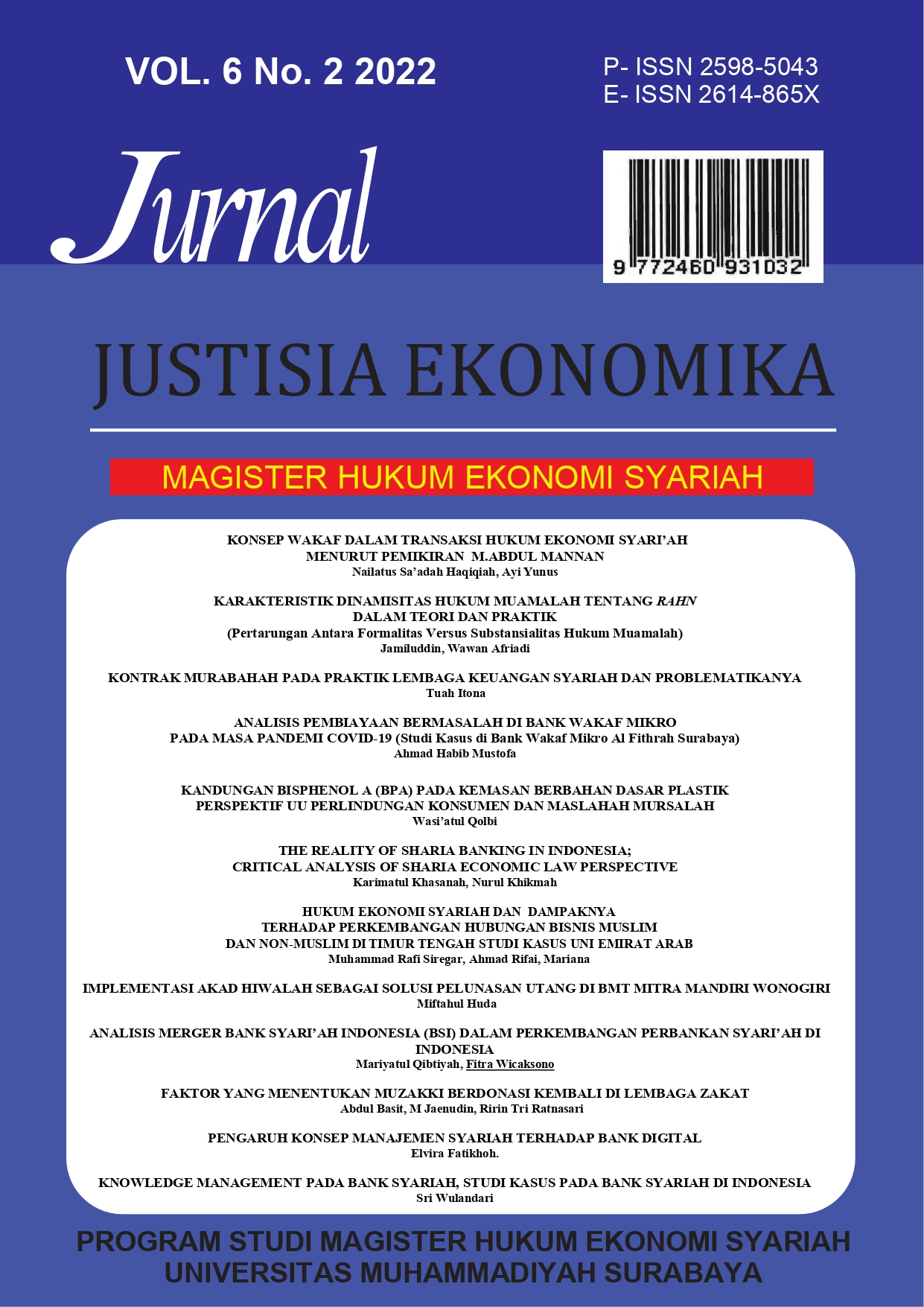ANALISIS PEMBIAYAAN BERMASALAH DI BANK WAKAF MIKRO PADA MASA PANDEMI COVID-19 (Studi Kasus di Bank Wakaf Mikro Al Fithrah Surabaya)
Abstrak
This study aims to identify and analyze non performing financing at Bank Wakaf Mikro (BWM) Al Fithrah during the covid-19 pandemic. This type of research is descriptive qualitative using case study method at BWM Al Fithrah Surabaya. Research data was collected by direct observation and interviews with manager, supervisor, and customers at BWM Al Fithrah Surabaya regarding non performing financing during the Covid-19 pandemic, added with documents and financial reports. The data was processed by researcher, validated by triangulation techniques and analyzed with a descriptive-qualitative mindset. The results of the study conclude: Firstly, the increasing ratio of non performing financing during the Covid-19 pandemic in 2020 was caused by declining customer’s income and the accompaniment named Halaqah Mingguan (HALMI) activities being temporarily suspended. Secondly, the trend of non performing financing ratio decreased during the Covid-19 pandemic in 2021 because HALMI activities had been implemented again, supported by regular payments from customers due to their business innovations that made their business run as usual, although the non performing financing  level was still relatively high due to the payment arrears from HALMI Barokah group which was disbanded during the covid-19 pandemic in 2020. Suggestions from researchers are: Firstly, HALMI should still be implemented in any situation, because it has been proven successful in minimizing non performing financing. Secondly, providing knowledge to customers about the importance of business innovation. Third, provide references and training so that customers will be able to expand their business.
Keywords: Non Performing Financing, Covid-19 Pandemic, Bank Wakaf Mikro.
Referensi
Dokumen Pembiayaan BWM Al Fithrah Tahun 2022
Fajar Sulaiman, Pembiayaan Bermasalah BWM 0%, Ini Rahasianya, https://www.wartaekonomi.co.id/read176543/pembiayaan-bermasalah-bwm-0-ini-rahasianya.html, diakses pada 07 Juni 2022.
Fatwa Dewan Syariah Nasional No: 19/DSMMUI/IV/2001 tentang akad qardh dalam pembiayaan
Hurley, R. F. dan G. Hult., Innovation, Market Orientation, and Organizational Learning: An Integration and Empirical Examination, Journal of Marketing: 1998 Vol. 62.
Infografis Bank Wakaf Mikro Mendorong Ekonomi Umat, www.ojk.go.id, diakses pada 12 Agustus 2021, pada pukul 10:45.
Lukihardianti, Arie, Bank Wakaf Mikro Sempat Terimbas Pandemi Covid 19, www.republika.co.id, diakses 03 Maret 2022 pukul 09:03.
Lukman Hakim, 2002, 87 Persen Pelaku UMKM di Jawa Timur Terdampak Pandemi covid-19, www.daerah.sindonews.com
Kasmir., 2015. Dasar-dasar Perbankan, Jakarta: Rajawali Pers, edisi Revisi.
Keputusan Menteri Negara KUKM 96/Kep/M.KUKM/IX/2004
Laporan Keuangan BWM Al Fithrah 2019, data diolah.
Laporan Keuangan Bulanan BWM Al Fithrah Tahun 2020.
Profil Bank Wakaf Mikro Al Fithrah Surabaya, http://lkmsbwm.id/bwm/profil/357800001, diakses pada 10 April 2022.
Nurrinda Amalia, Supervisor BWM Al Fithrah, Wawancara, 25 Mei 2022
Retno, Nasabah BWM Al Fithrah, Wawancara, 30 Mei 2022.
Suharsimi Arikunto, 2002, Metodologi Penelitian: Suatu Pendekatan Proposal, PT. Rineka Cita, Jakarta.
Sri Ambarwati, Nasabah BWM Al Fithrah, Wawancara, 24-30 Mei 2022.
Sri Harnanik, Nasabah BWM Al Fithrah, Wawancara, 30 Mei 2022
Suroso, Manajer Bank Wakaf Mikro Al Fithrah Surabaya, Wawancara, 12 Agustus 2021.
Susanto, A.B., R.Masri Sareb Putra, 60 Management Gems, Jakarta: Gramedia Publishing,
Unduhan
Diterbitkan
Cara Mengutip
Terbitan
Bagian
Lisensi
HAK CIPTA
Penulis yang mengirimkan artikel dalam jurnal Justisia Ekonomika harus memahami dan menyetujui persyaratan tentang hak cipta jurnal Justisia Ekonomika sebagai berikut:
1. Hak Cipta tulisan / artikel yang diterbitkan di jurnal Justisia Ekonomika otomatis menjadi hak pengelola jurnal atau publisher
2. Meskipun Hak Cipta atas tulisan yang telah diterbitkan di jurnal Justisia Ekonomika adalah menjadi haknya publisher, tetapi penulis masih mempunyai hak untuk : a). Penulis boleh meng-upload di repository kampus, b). Penulis boleh meng-upload di webnya sendiri, c). Penulis boleh meng-upload di google schoolar, orchid dan sinta
LISENSI
Lisensi atas tulisan / artikel yang diterbitkan di jurnal Justisia Ekonomika adalah menggunakan Creative Commons dengan atribusi CC-BY-NC 4.0






















